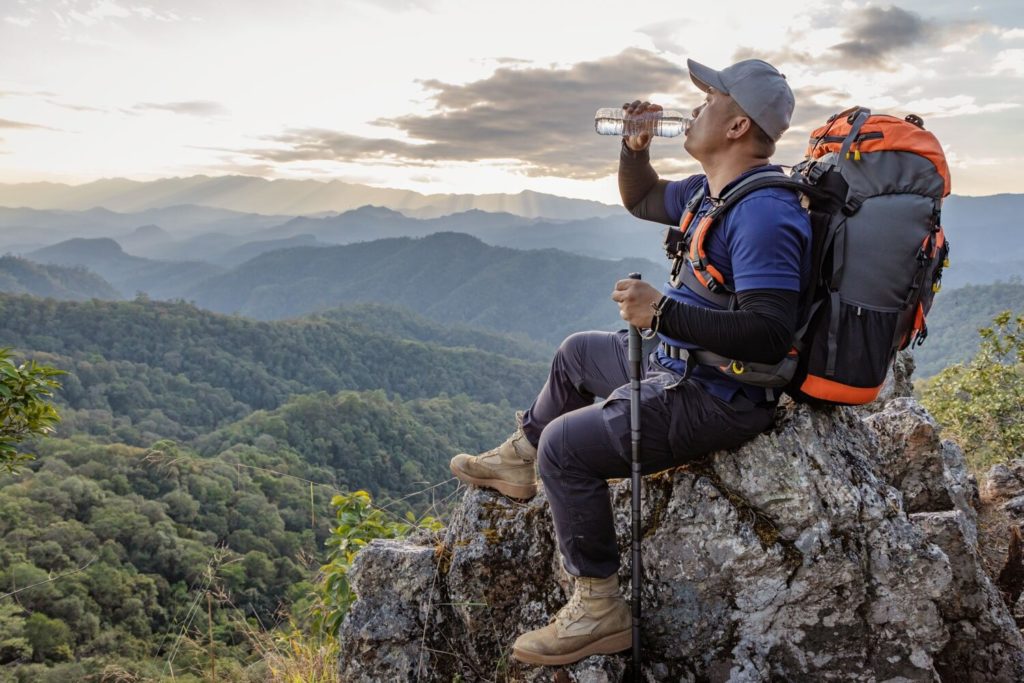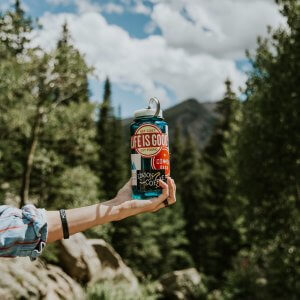
Water can really weigh you down if you carry too much of it when you don’t need to. I used to do this all of the time, first as a day hiker and then later as a backpacker.
The main ways to carry and transport waters are water bladders (Camelbak, Platypus) or water bottles (Nalgene, reuse bottle). There are hikers that swear by bladders, and others by water bottles. Some bring both. In the end, it’s all personal preference through experience. As a day hiker, I used to carry 3 or 4 liters of water for a long summer hike, even though I was surrounded by water sources in the mountains where I hiked. I hadn’t learned to use a water filter
yet, and would often turn back when my water started to run out rather than resupply from the streams at my feet.
Humans should consume approximately 2 liters daily. A 10-mile day hike is a different story though. Variables like terrain, weather, and pace will dictate how much YOU need to drink… potentially much more than 2 liters. I can still remember the first time I used a water filter. It was at Bear Mountain in New York. I stopped at a stream and pumped 2 liters of water into my platypus hydration system. It was one of the most liberating moments I’ve ever experienced hiking! I knew from then on, that the distance I could hike in a day would never be limited by the amount of water I could carry in my pack.
But even then, I still carried too much water between fill-ups, especially on backpacking trips. I’d often carry 4 liters or more in my pack at any given time, even when I was experimenting with lightweight backpacking.
Nowadays, I carry a lot less water with me on day hikes and backpacking trips and top out at 2 liters max. If I need more, I just stop and filter some. Granted I mainly hike in New England or on the Appalachian Trail where water is plentiful, but it’s something to keep in mind. I’m not suggesting that you drink less, but that you carry less: I still manage to drink about 5 liters a day regardless of whether I’m day hiking or backpacking. For me a 4-hour hike, usually motivates me to bring 2+ liters. 2 at the very minimum and 4 max. So going off of that for every 2 hours you bring a liter of water FOR YOURSELF. If you have kids/parents/siblings you are hiking with, they should have their own water. Heat exhaustion is a pretty serious business and when you are hiking out there the last thing you need is to get delirious. Plus, the hike won’t be enjoyable, and isn’t that the point? This is pretty much what I do year-round, except in winter when I don’t resupply during the day if I need to melt snow. I still pre-hydrate (although a bit more) and carry a maximum of 2 liters unless there’s something about the route I’m on which requires that I carry more.
Here’s my system:
- I prehydrate by drinking a liter of water just before I start hiking because carrying water
inside you is lighter than carrying water on your back!
- I start out with 2 liters and drink about 1 pint every hour.
- I plan my route carefully so I know where there is water if I run out, and I can carry more if necessary.
- I came up when I resupply at a stream or pond, drinking a full liter on the spot.
- I drink a liter at the end of the day after I’ve finished hiking.

